Analysis of Entrepreneurial Mindset in Business (Unit 9 Report)
VerifiedAdded on 2022/06/14
|36
|7537
|12
Report
AI Summary
This report delves into the multifaceted concept of the entrepreneurial mindset within various corporate contexts, aiming to foster entrepreneurial spirit. It meticulously examines the key traits and skills that distinguish successful entrepreneurs from traditional business managers, supported by a detailed table outlining personality traits and skills. The analysis extends to real-world examples, featuring global entrepreneurs like Jeff Bezos (Amazon), local entrepreneurs like Pham Nhat Vuong (Vingroup), and social enterprises exemplified by Bill Drayton (Ashoka). The report highlights how their backgrounds and experiences shape their motivations. Furthermore, it explores how motivation theory principles can be applied to staff development, offering valuable insights and suggestions for organizations seeking to cultivate an entrepreneurial culture. The report is structured to provide a comprehensive understanding of the entrepreneurial mindset, including its characteristics, skills, and practical applications.
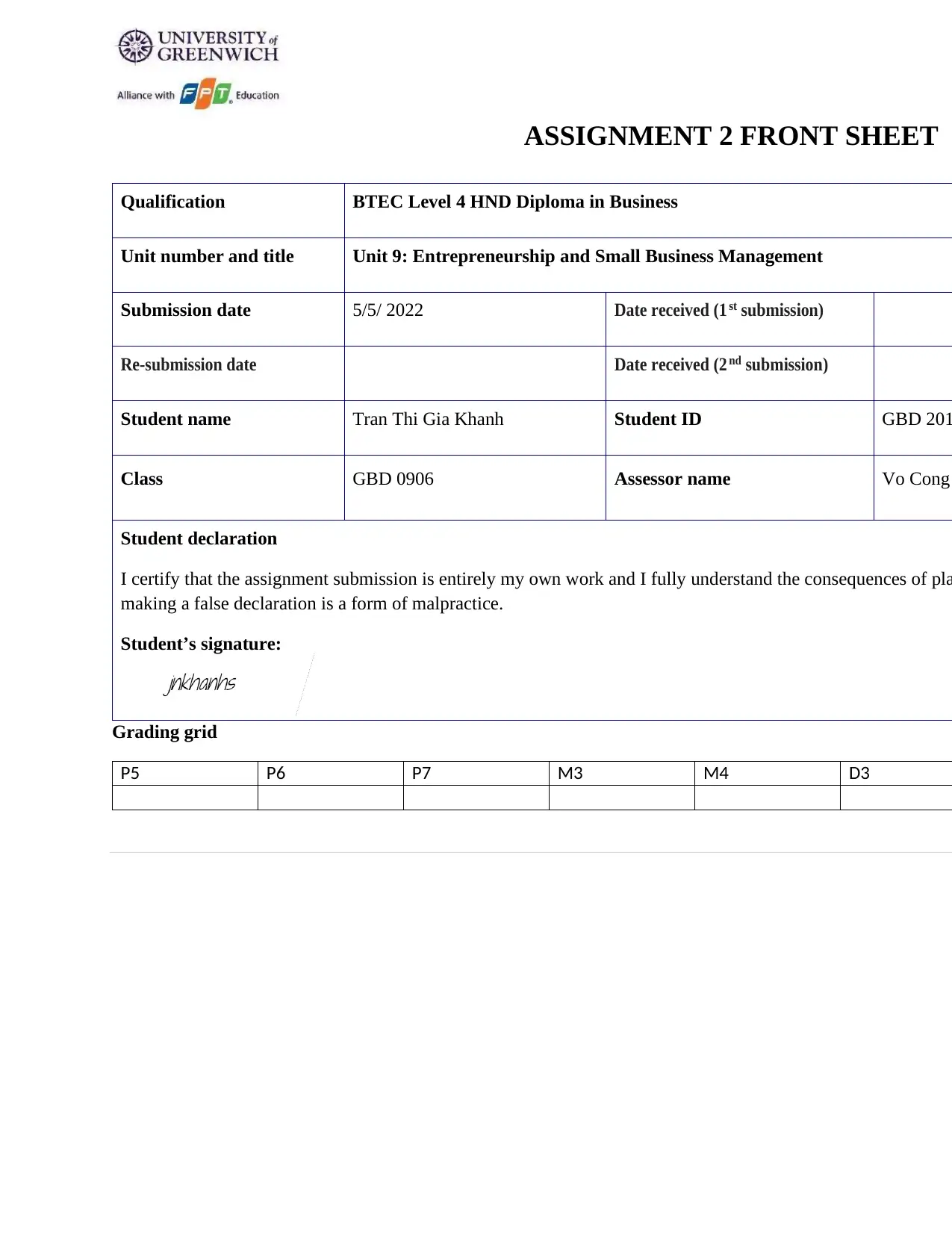
ASSIGNMENT 2 FRONT SHEET
Qualification BTEC Level 4 HND Diploma in Business
Unit number and title Unit 9: Entrepreneurship and Small Business Management
Submission date 5/5/ 2022 Date received (1 st submission)
Re-submission date Date received (2 nd submission)
Student name Tran Thi Gia Khanh Student ID GBD 201
Class GBD 0906 Assessor name Vo Cong
Student declaration
I certify that the assignment submission is entirely my own work and I fully understand the consequences of pla
making a false declaration is a form of malpractice.
Student’s signature:
Grading grid
P5 P6 P7 M3 M4 D3
Qualification BTEC Level 4 HND Diploma in Business
Unit number and title Unit 9: Entrepreneurship and Small Business Management
Submission date 5/5/ 2022 Date received (1 st submission)
Re-submission date Date received (2 nd submission)
Student name Tran Thi Gia Khanh Student ID GBD 201
Class GBD 0906 Assessor name Vo Cong
Student declaration
I certify that the assignment submission is entirely my own work and I fully understand the consequences of pla
making a false declaration is a form of malpractice.
Student’s signature:
Grading grid
P5 P6 P7 M3 M4 D3
Paraphrase This Document
Need a fresh take? Get an instant paraphrase of this document with our AI Paraphraser
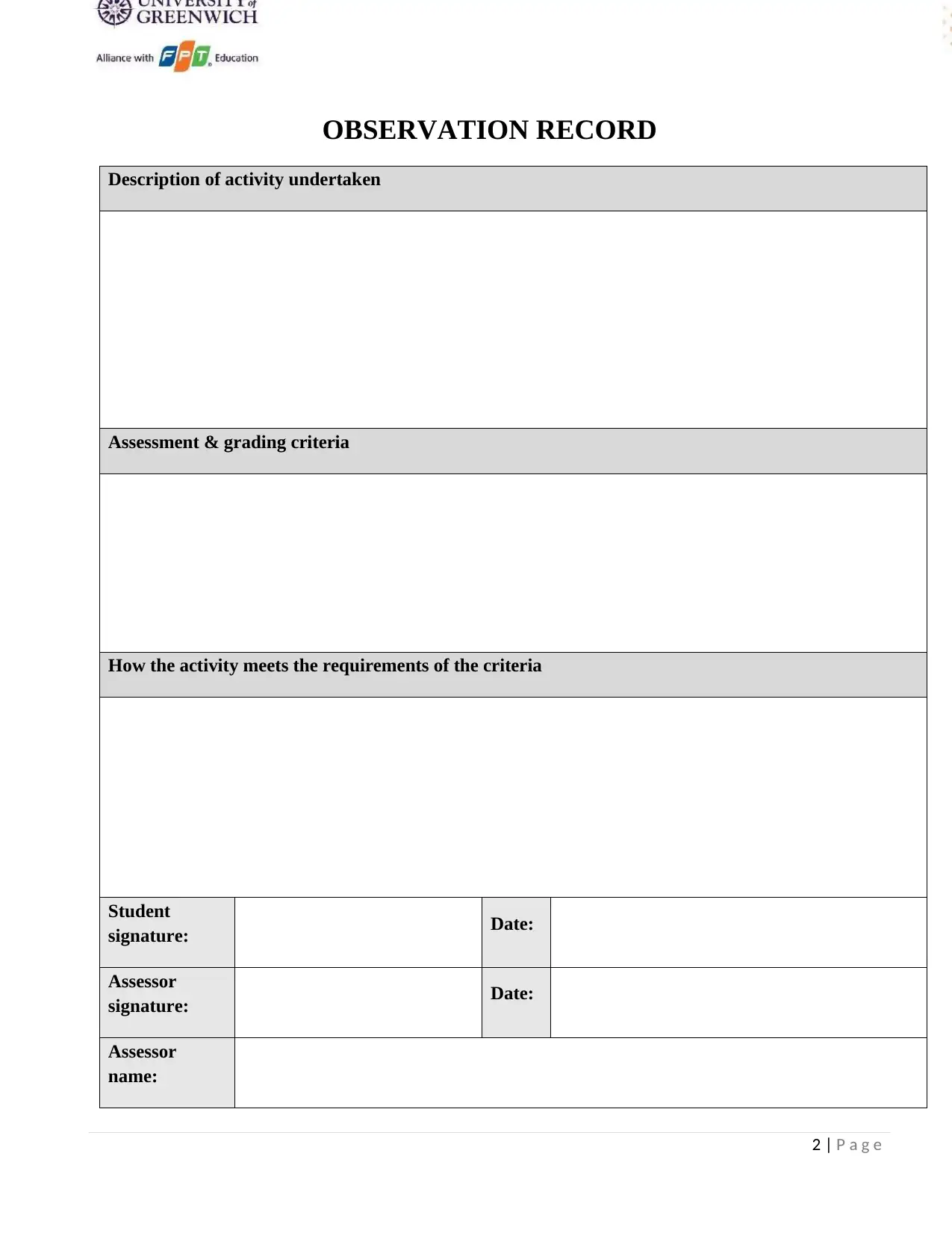
2 | P a g e
OBSERVATION RECORD
Description of activity undertaken
Assessment & grading criteria
How the activity meets the requirements of the criteria
Student
signature: Date:
Assessor
signature: Date:
Assessor
name:
OBSERVATION RECORD
Description of activity undertaken
Assessment & grading criteria
How the activity meets the requirements of the criteria
Student
signature: Date:
Assessor
signature: Date:
Assessor
name:

3 | P a g e
Summative Feedback: Resubmission Feedback:
Grade: Assessor Signature: Date:
Internal Verifier’s Comments:
Signature & Date:
Summative Feedback: Resubmission Feedback:
Grade: Assessor Signature: Date:
Internal Verifier’s Comments:
Signature & Date:
⊘ This is a preview!⊘
Do you want full access?
Subscribe today to unlock all pages.

Trusted by 1+ million students worldwide
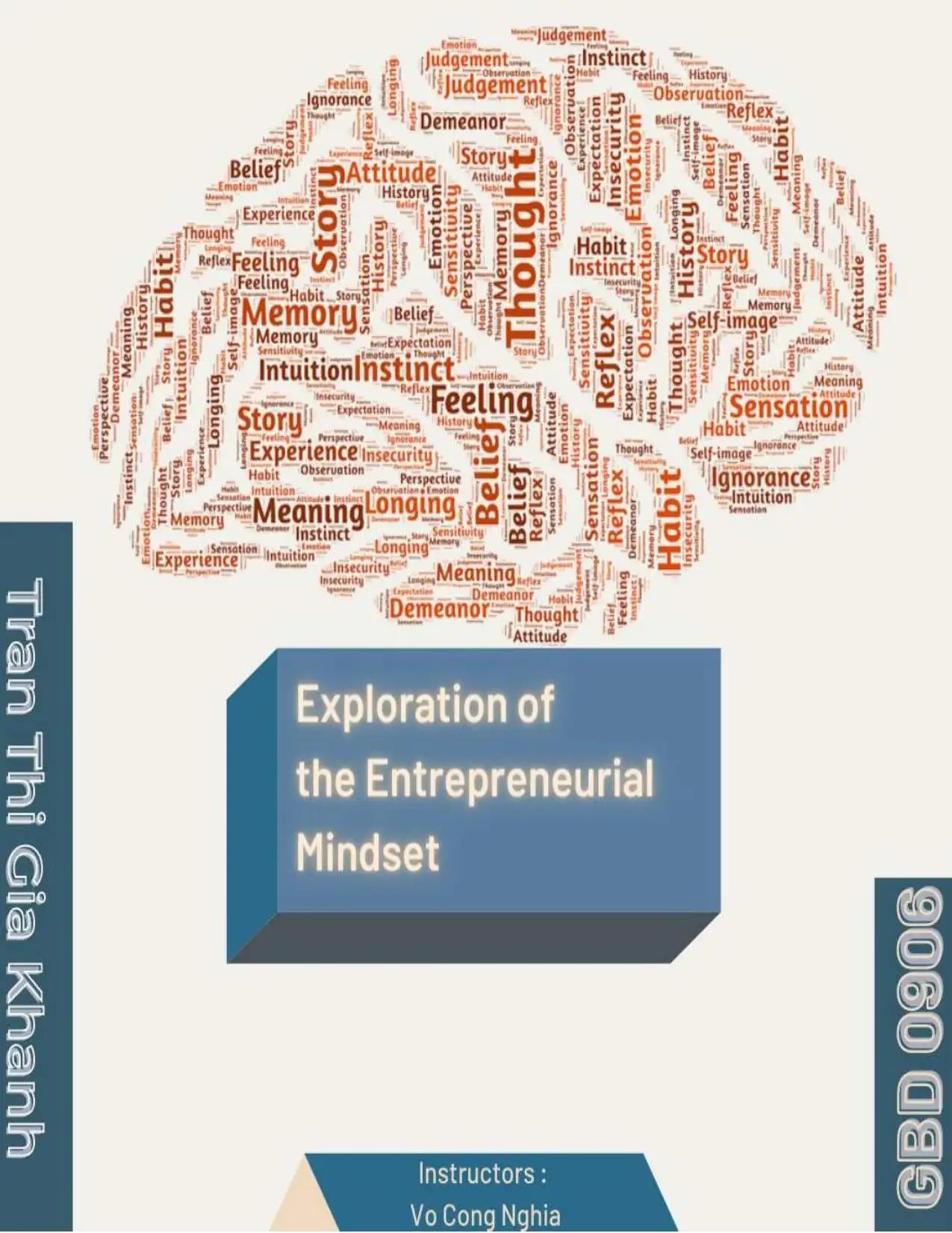
4 | P a g e
Paraphrase This Document
Need a fresh take? Get an instant paraphrase of this document with our AI Paraphraser
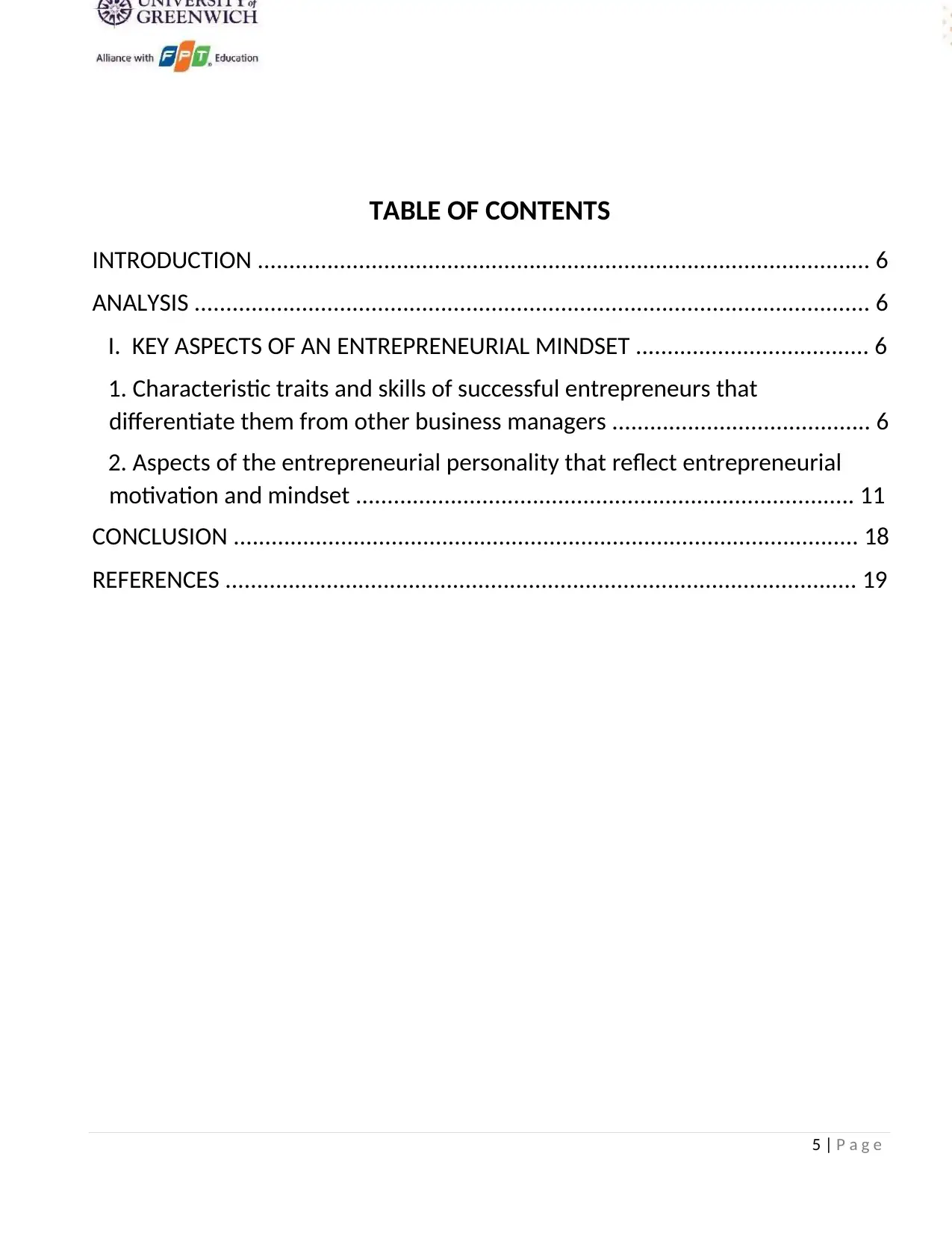
5 | P a g e
TABLE OF CONTENTS
INTRODUCTION ................................................................................................. 6
ANALYSIS ........................................................................................................... 6
I. KEY ASPECTS OF AN ENTREPRENEURIAL MINDSET ..................................... 6
1. Characteristic traits and skills of successful entrepreneurs that
differentiate them from other business managers ......................................... 6
2. Aspects of the entrepreneurial personality that reflect entrepreneurial
motivation and mindset ............................................................................... 11
CONCLUSION ................................................................................................... 18
REFERENCES .................................................................................................... 19
TABLE OF CONTENTS
INTRODUCTION ................................................................................................. 6
ANALYSIS ........................................................................................................... 6
I. KEY ASPECTS OF AN ENTREPRENEURIAL MINDSET ..................................... 6
1. Characteristic traits and skills of successful entrepreneurs that
differentiate them from other business managers ......................................... 6
2. Aspects of the entrepreneurial personality that reflect entrepreneurial
motivation and mindset ............................................................................... 11
CONCLUSION ................................................................................................... 18
REFERENCES .................................................................................................... 19
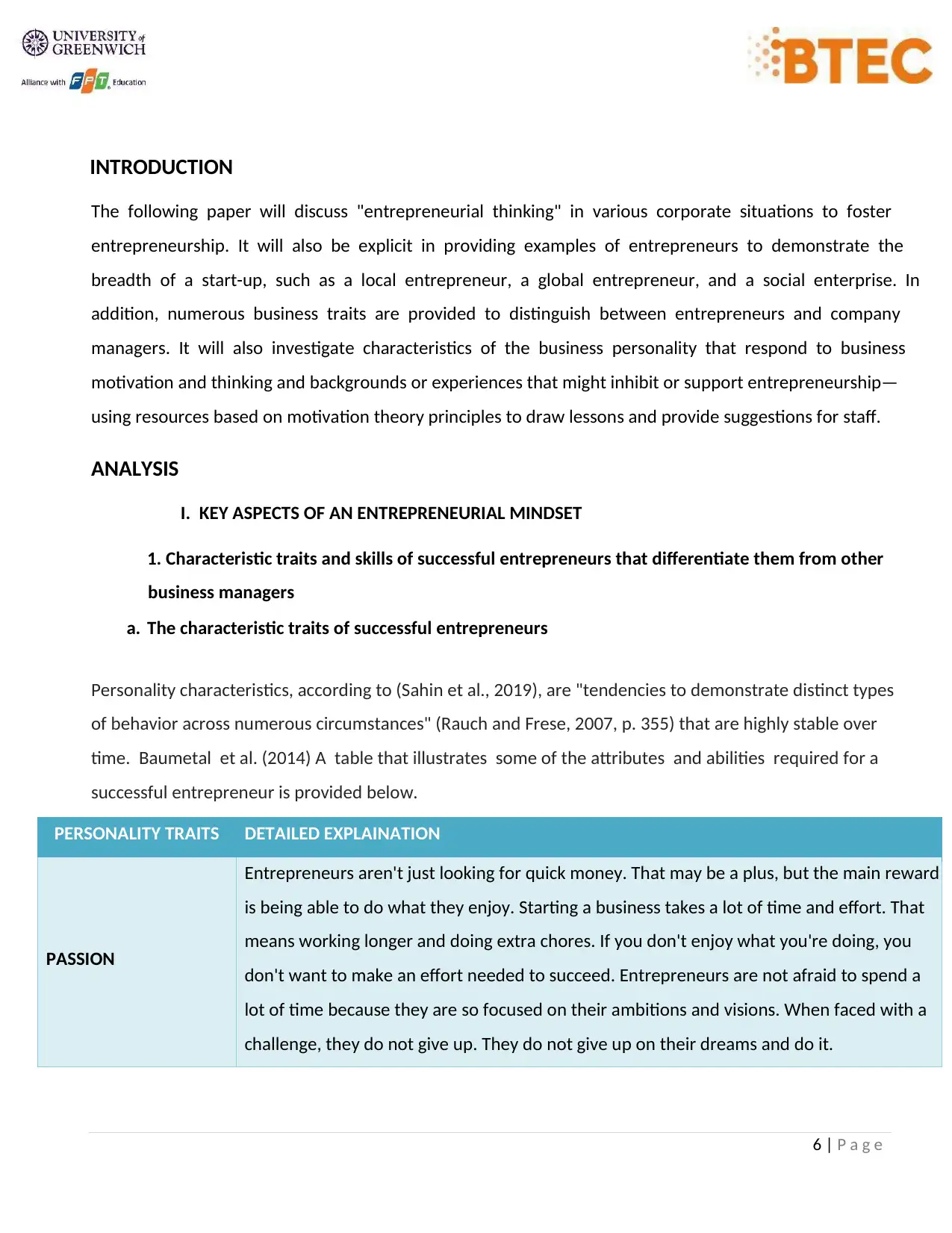
6 | P a g e
INTRODUCTION
The following paper will discuss "entrepreneurial thinking" in various corporate situations to foster
entrepreneurship. It will also be explicit in providing examples of entrepreneurs to demonstrate the
breadth of a start-up, such as a local entrepreneur, a global entrepreneur, and a social enterprise. In
addition, numerous business traits are provided to distinguish between entrepreneurs and company
managers. It will also investigate characteristics of the business personality that respond to business
motivation and thinking and backgrounds or experiences that might inhibit or support entrepreneurship—
using resources based on motivation theory principles to draw lessons and provide suggestions for staff.
ANALYSIS
I. KEY ASPECTS OF AN ENTREPRENEURIAL MINDSET
1. Characteristic traits and skills of successful entrepreneurs that differentiate them from other
business managers
a. The characteristic traits of successful entrepreneurs
Personality characteristics, according to (Sahin et al., 2019), are "tendencies to demonstrate distinct types
of behavior across numerous circumstances" (Rauch and Frese, 2007, p. 355) that are highly stable over
time. Baumetal et al. (2014) A table that illustrates some of the attributes and abilities required for a
successful entrepreneur is provided below.
PERSONALITY TRAITS DETAILED EXPLAINATION
PASSION
Entrepreneurs aren't just looking for quick money. That may be a plus, but the main reward
is being able to do what they enjoy. Starting a business takes a lot of time and effort. That
means working longer and doing extra chores. If you don't enjoy what you're doing, you
don't want to make an effort needed to succeed. Entrepreneurs are not afraid to spend a
lot of time because they are so focused on their ambitions and visions. When faced with a
challenge, they do not give up. They do not give up on their dreams and do it.
INTRODUCTION
The following paper will discuss "entrepreneurial thinking" in various corporate situations to foster
entrepreneurship. It will also be explicit in providing examples of entrepreneurs to demonstrate the
breadth of a start-up, such as a local entrepreneur, a global entrepreneur, and a social enterprise. In
addition, numerous business traits are provided to distinguish between entrepreneurs and company
managers. It will also investigate characteristics of the business personality that respond to business
motivation and thinking and backgrounds or experiences that might inhibit or support entrepreneurship—
using resources based on motivation theory principles to draw lessons and provide suggestions for staff.
ANALYSIS
I. KEY ASPECTS OF AN ENTREPRENEURIAL MINDSET
1. Characteristic traits and skills of successful entrepreneurs that differentiate them from other
business managers
a. The characteristic traits of successful entrepreneurs
Personality characteristics, according to (Sahin et al., 2019), are "tendencies to demonstrate distinct types
of behavior across numerous circumstances" (Rauch and Frese, 2007, p. 355) that are highly stable over
time. Baumetal et al. (2014) A table that illustrates some of the attributes and abilities required for a
successful entrepreneur is provided below.
PERSONALITY TRAITS DETAILED EXPLAINATION
PASSION
Entrepreneurs aren't just looking for quick money. That may be a plus, but the main reward
is being able to do what they enjoy. Starting a business takes a lot of time and effort. That
means working longer and doing extra chores. If you don't enjoy what you're doing, you
don't want to make an effort needed to succeed. Entrepreneurs are not afraid to spend a
lot of time because they are so focused on their ambitions and visions. When faced with a
challenge, they do not give up. They do not give up on their dreams and do it.
⊘ This is a preview!⊘
Do you want full access?
Subscribe today to unlock all pages.

Trusted by 1+ million students worldwide
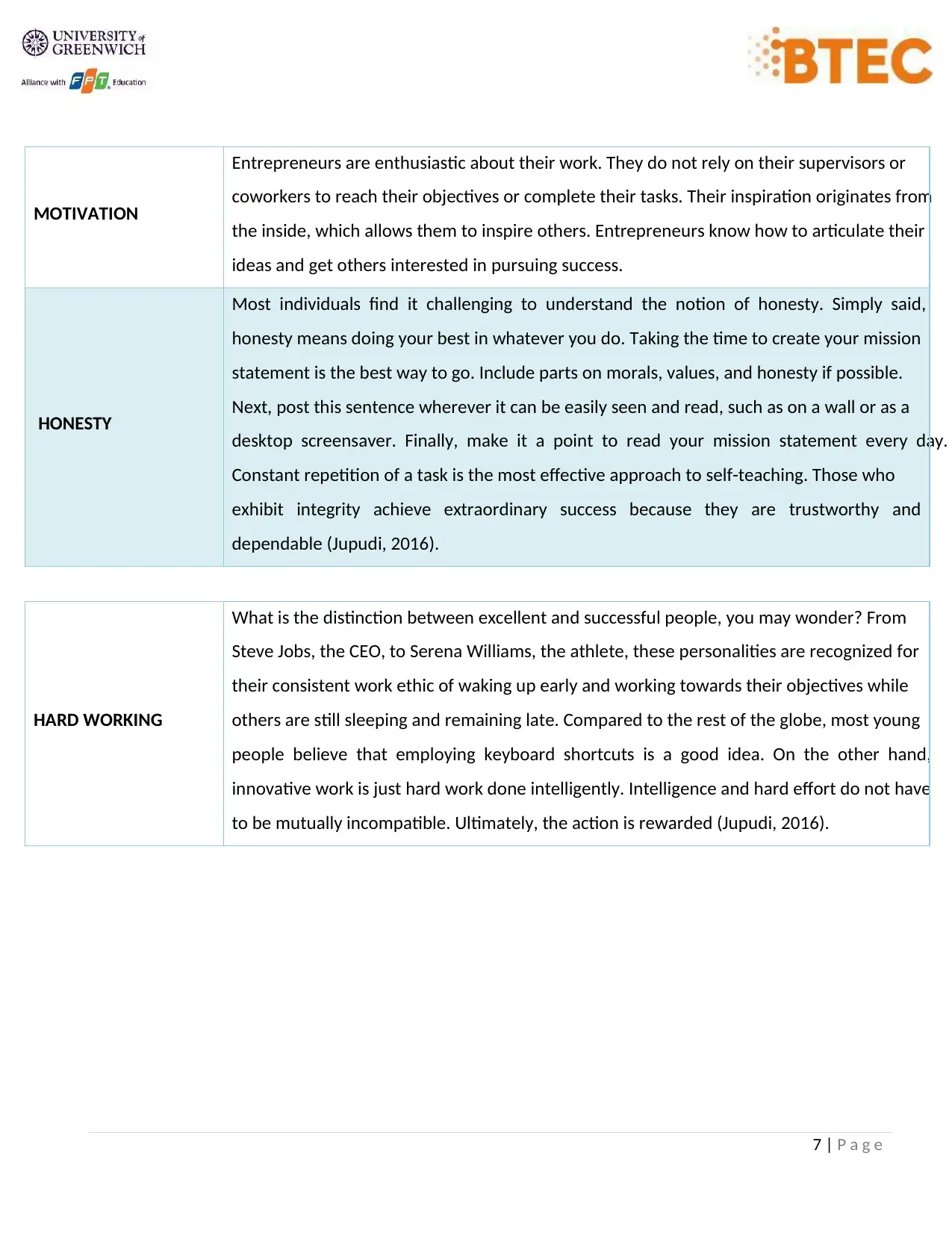
7 | P a g e
MOTIVATION
Entrepreneurs are enthusiastic about their work. They do not rely on their supervisors or
coworkers to reach their objectives or complete their tasks. Their inspiration originates from
the inside, which allows them to inspire others. Entrepreneurs know how to articulate their
ideas and get others interested in pursuing success.
HONESTY
Most individuals find it challenging to understand the notion of honesty. Simply said,
honesty means doing your best in whatever you do. Taking the time to create your mission
statement is the best way to go. Include parts on morals, values, and honesty if possible.
Next, post this sentence wherever it can be easily seen and read, such as on a wall or as a
desktop screensaver. Finally, make it a point to read your mission statement every day.
Constant repetition of a task is the most effective approach to self-teaching. Those who
exhibit integrity achieve extraordinary success because they are trustworthy and
dependable (Jupudi, 2016).
HARD WORKING
What is the distinction between excellent and successful people, you may wonder? From
Steve Jobs, the CEO, to Serena Williams, the athlete, these personalities are recognized for
their consistent work ethic of waking up early and working towards their objectives while
others are still sleeping and remaining late. Compared to the rest of the globe, most young
people believe that employing keyboard shortcuts is a good idea. On the other hand,
innovative work is just hard work done intelligently. Intelligence and hard effort do not have
to be mutually incompatible. Ultimately, the action is rewarded (Jupudi, 2016).
MOTIVATION
Entrepreneurs are enthusiastic about their work. They do not rely on their supervisors or
coworkers to reach their objectives or complete their tasks. Their inspiration originates from
the inside, which allows them to inspire others. Entrepreneurs know how to articulate their
ideas and get others interested in pursuing success.
HONESTY
Most individuals find it challenging to understand the notion of honesty. Simply said,
honesty means doing your best in whatever you do. Taking the time to create your mission
statement is the best way to go. Include parts on morals, values, and honesty if possible.
Next, post this sentence wherever it can be easily seen and read, such as on a wall or as a
desktop screensaver. Finally, make it a point to read your mission statement every day.
Constant repetition of a task is the most effective approach to self-teaching. Those who
exhibit integrity achieve extraordinary success because they are trustworthy and
dependable (Jupudi, 2016).
HARD WORKING
What is the distinction between excellent and successful people, you may wonder? From
Steve Jobs, the CEO, to Serena Williams, the athlete, these personalities are recognized for
their consistent work ethic of waking up early and working towards their objectives while
others are still sleeping and remaining late. Compared to the rest of the globe, most young
people believe that employing keyboard shortcuts is a good idea. On the other hand,
innovative work is just hard work done intelligently. Intelligence and hard effort do not have
to be mutually incompatible. Ultimately, the action is rewarded (Jupudi, 2016).
Paraphrase This Document
Need a fresh take? Get an instant paraphrase of this document with our AI Paraphraser
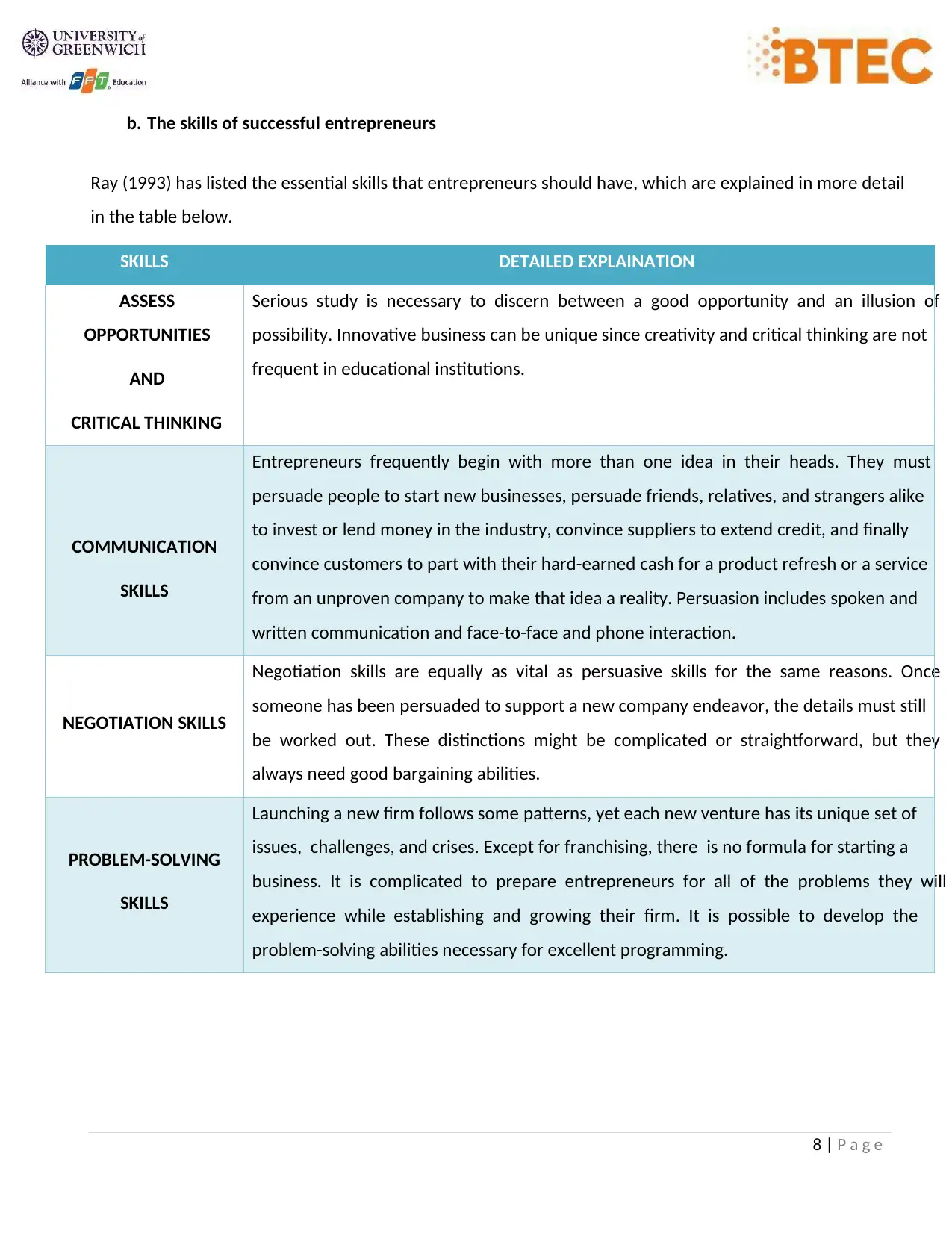
8 | P a g e
b. The skills of successful entrepreneurs
Ray (1993) has listed the essential skills that entrepreneurs should have, which are explained in more detail
in the table below.
SKILLS DETAILED EXPLAINATION
ASSESS
OPPORTUNITIES
AND
CRITICAL THINKING
Serious study is necessary to discern between a good opportunity and an illusion of
possibility. Innovative business can be unique since creativity and critical thinking are not
frequent in educational institutions.
COMMUNICATION
SKILLS
Entrepreneurs frequently begin with more than one idea in their heads. They must
persuade people to start new businesses, persuade friends, relatives, and strangers alike
to invest or lend money in the industry, convince suppliers to extend credit, and finally
convince customers to part with their hard-earned cash for a product refresh or a service
from an unproven company to make that idea a reality. Persuasion includes spoken and
written communication and face-to-face and phone interaction.
NEGOTIATION SKILLS
Negotiation skills are equally as vital as persuasive skills for the same reasons. Once
someone has been persuaded to support a new company endeavor, the details must still
be worked out. These distinctions might be complicated or straightforward, but they
always need good bargaining abilities.
PROBLEM-SOLVING
SKILLS
Launching a new firm follows some patterns, yet each new venture has its unique set of
issues, challenges, and crises. Except for franchising, there is no formula for starting a
business. It is complicated to prepare entrepreneurs for all of the problems they will
experience while establishing and growing their firm. It is possible to develop the
problem-solving abilities necessary for excellent programming.
b. The skills of successful entrepreneurs
Ray (1993) has listed the essential skills that entrepreneurs should have, which are explained in more detail
in the table below.
SKILLS DETAILED EXPLAINATION
ASSESS
OPPORTUNITIES
AND
CRITICAL THINKING
Serious study is necessary to discern between a good opportunity and an illusion of
possibility. Innovative business can be unique since creativity and critical thinking are not
frequent in educational institutions.
COMMUNICATION
SKILLS
Entrepreneurs frequently begin with more than one idea in their heads. They must
persuade people to start new businesses, persuade friends, relatives, and strangers alike
to invest or lend money in the industry, convince suppliers to extend credit, and finally
convince customers to part with their hard-earned cash for a product refresh or a service
from an unproven company to make that idea a reality. Persuasion includes spoken and
written communication and face-to-face and phone interaction.
NEGOTIATION SKILLS
Negotiation skills are equally as vital as persuasive skills for the same reasons. Once
someone has been persuaded to support a new company endeavor, the details must still
be worked out. These distinctions might be complicated or straightforward, but they
always need good bargaining abilities.
PROBLEM-SOLVING
SKILLS
Launching a new firm follows some patterns, yet each new venture has its unique set of
issues, challenges, and crises. Except for franchising, there is no formula for starting a
business. It is complicated to prepare entrepreneurs for all of the problems they will
experience while establishing and growing their firm. It is possible to develop the
problem-solving abilities necessary for excellent programming.
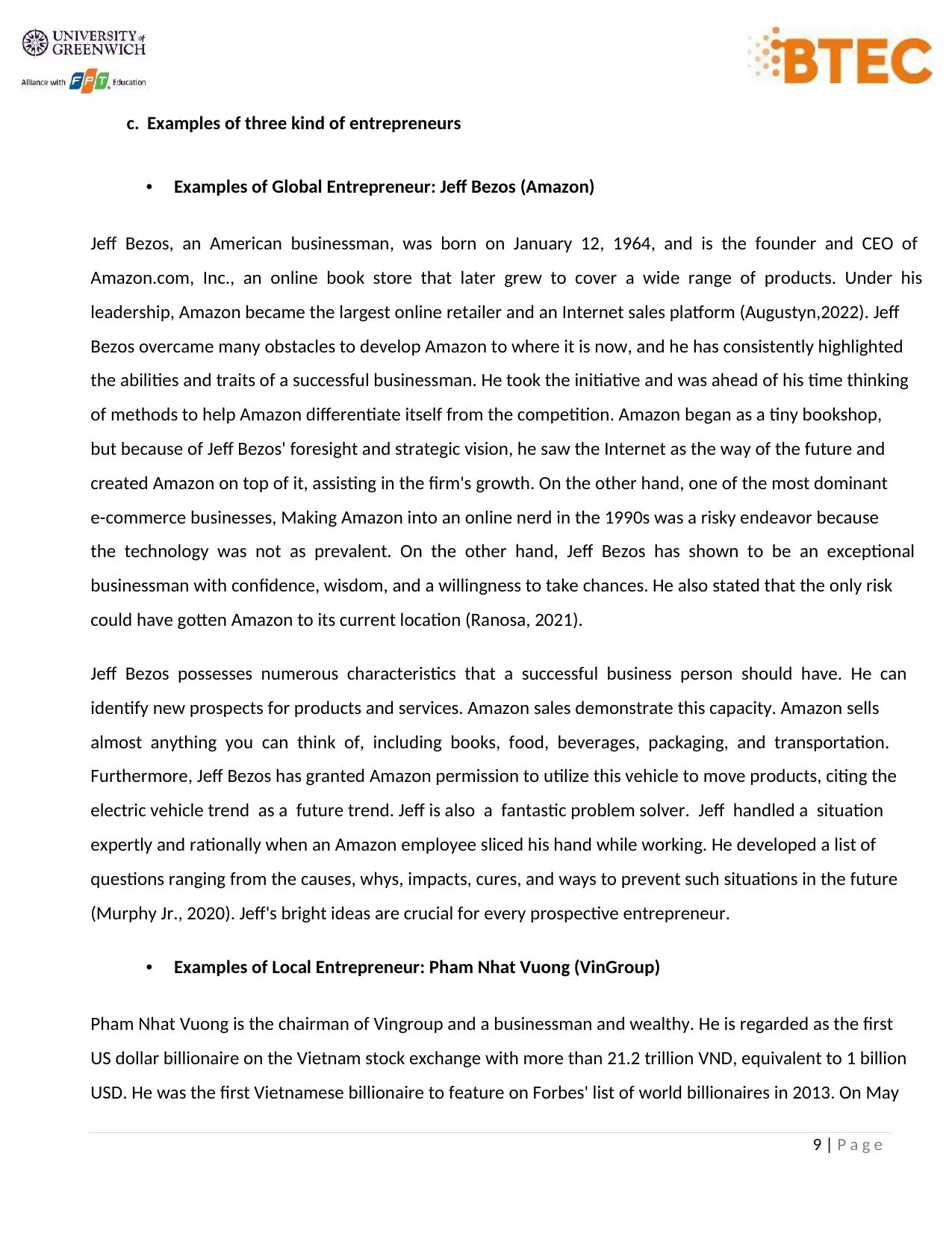
9 | P a g e
c. Examples of three kind of entrepreneurs
• Examples of Global Entrepreneur: Jeff Bezos (Amazon)
Jeff Bezos, an American businessman, was born on January 12, 1964, and is the founder and CEO of
Amazon.com, Inc., an online book store that later grew to cover a wide range of products. Under his
leadership, Amazon became the largest online retailer and an Internet sales platform (Augustyn,2022). Jeff
Bezos overcame many obstacles to develop Amazon to where it is now, and he has consistently highlighted
the abilities and traits of a successful businessman. He took the initiative and was ahead of his time thinking
of methods to help Amazon differentiate itself from the competition. Amazon began as a tiny bookshop,
but because of Jeff Bezos' foresight and strategic vision, he saw the Internet as the way of the future and
created Amazon on top of it, assisting in the firm's growth. On the other hand, one of the most dominant
e-commerce businesses, Making Amazon into an online nerd in the 1990s was a risky endeavor because
the technology was not as prevalent. On the other hand, Jeff Bezos has shown to be an exceptional
businessman with confidence, wisdom, and a willingness to take chances. He also stated that the only risk
could have gotten Amazon to its current location (Ranosa, 2021).
Jeff Bezos possesses numerous characteristics that a successful business person should have. He can
identify new prospects for products and services. Amazon sales demonstrate this capacity. Amazon sells
almost anything you can think of, including books, food, beverages, packaging, and transportation.
Furthermore, Jeff Bezos has granted Amazon permission to utilize this vehicle to move products, citing the
electric vehicle trend as a future trend. Jeff is also a fantastic problem solver. Jeff handled a situation
expertly and rationally when an Amazon employee sliced his hand while working. He developed a list of
questions ranging from the causes, whys, impacts, cures, and ways to prevent such situations in the future
(Murphy Jr., 2020). Jeff's bright ideas are crucial for every prospective entrepreneur.
• Examples of Local Entrepreneur: Pham Nhat Vuong (VinGroup)
Pham Nhat Vuong is the chairman of Vingroup and a businessman and wealthy. He is regarded as the first
US dollar billionaire on the Vietnam stock exchange with more than 21.2 trillion VND, equivalent to 1 billion
USD. He was the first Vietnamese billionaire to feature on Forbes' list of world billionaires in 2013. On May
c. Examples of three kind of entrepreneurs
• Examples of Global Entrepreneur: Jeff Bezos (Amazon)
Jeff Bezos, an American businessman, was born on January 12, 1964, and is the founder and CEO of
Amazon.com, Inc., an online book store that later grew to cover a wide range of products. Under his
leadership, Amazon became the largest online retailer and an Internet sales platform (Augustyn,2022). Jeff
Bezos overcame many obstacles to develop Amazon to where it is now, and he has consistently highlighted
the abilities and traits of a successful businessman. He took the initiative and was ahead of his time thinking
of methods to help Amazon differentiate itself from the competition. Amazon began as a tiny bookshop,
but because of Jeff Bezos' foresight and strategic vision, he saw the Internet as the way of the future and
created Amazon on top of it, assisting in the firm's growth. On the other hand, one of the most dominant
e-commerce businesses, Making Amazon into an online nerd in the 1990s was a risky endeavor because
the technology was not as prevalent. On the other hand, Jeff Bezos has shown to be an exceptional
businessman with confidence, wisdom, and a willingness to take chances. He also stated that the only risk
could have gotten Amazon to its current location (Ranosa, 2021).
Jeff Bezos possesses numerous characteristics that a successful business person should have. He can
identify new prospects for products and services. Amazon sales demonstrate this capacity. Amazon sells
almost anything you can think of, including books, food, beverages, packaging, and transportation.
Furthermore, Jeff Bezos has granted Amazon permission to utilize this vehicle to move products, citing the
electric vehicle trend as a future trend. Jeff is also a fantastic problem solver. Jeff handled a situation
expertly and rationally when an Amazon employee sliced his hand while working. He developed a list of
questions ranging from the causes, whys, impacts, cures, and ways to prevent such situations in the future
(Murphy Jr., 2020). Jeff's bright ideas are crucial for every prospective entrepreneur.
• Examples of Local Entrepreneur: Pham Nhat Vuong (VinGroup)
Pham Nhat Vuong is the chairman of Vingroup and a businessman and wealthy. He is regarded as the first
US dollar billionaire on the Vietnam stock exchange with more than 21.2 trillion VND, equivalent to 1 billion
USD. He was the first Vietnamese billionaire to feature on Forbes' list of world billionaires in 2013. On May
⊘ This is a preview!⊘
Do you want full access?
Subscribe today to unlock all pages.

Trusted by 1+ million students worldwide
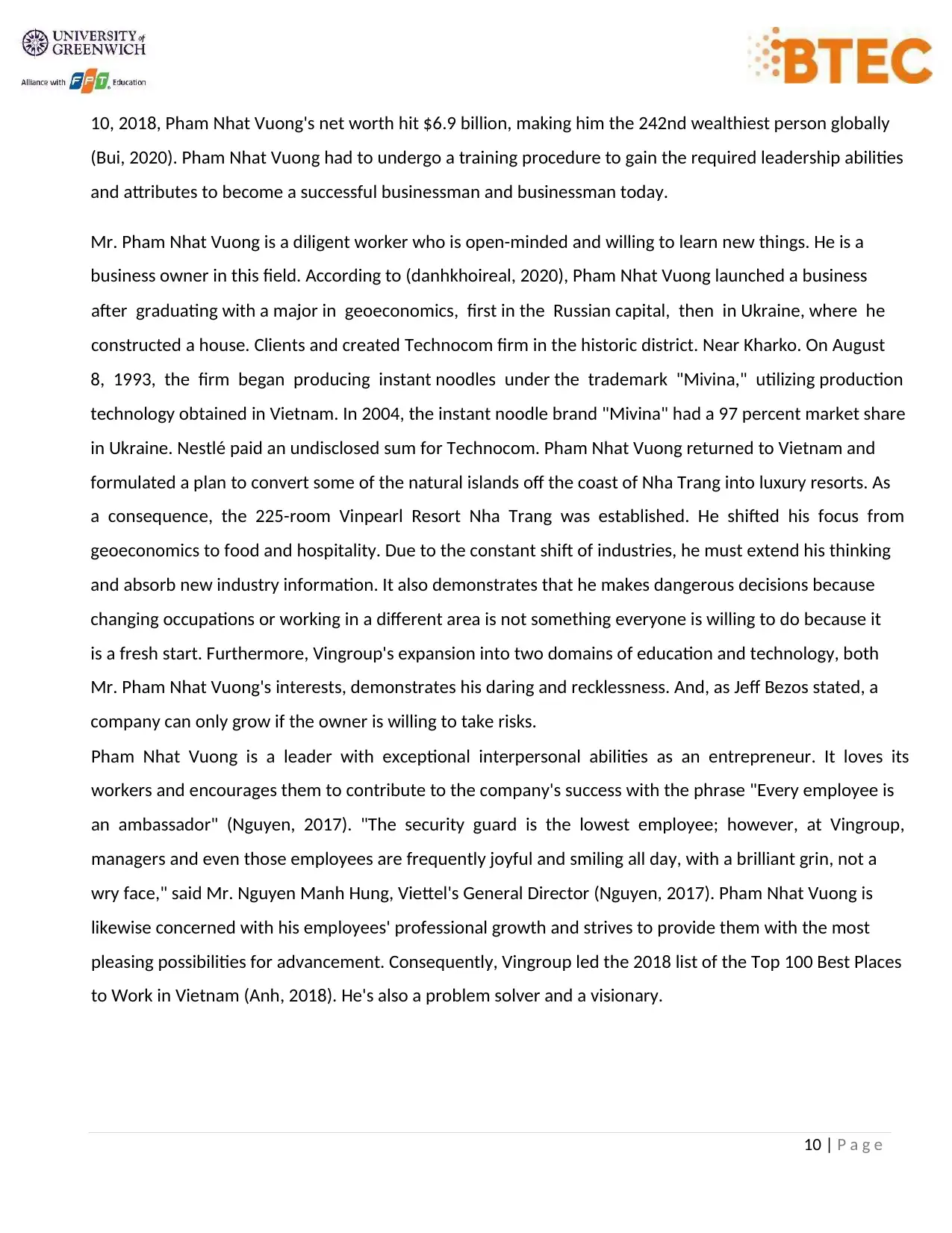
10 | P a g e
10, 2018, Pham Nhat Vuong's net worth hit $6.9 billion, making him the 242nd wealthiest person globally
(Bui, 2020). Pham Nhat Vuong had to undergo a training procedure to gain the required leadership abilities
and attributes to become a successful businessman and businessman today.
Mr. Pham Nhat Vuong is a diligent worker who is open-minded and willing to learn new things. He is a
business owner in this field. According to (danhkhoireal, 2020), Pham Nhat Vuong launched a business
after graduating with a major in geoeconomics, first in the Russian capital, then in Ukraine, where he
constructed a house. Clients and created Technocom firm in the historic district. Near Kharko. On August
8, 1993, the firm began producing instant noodles under the trademark "Mivina," utilizing production
technology obtained in Vietnam. In 2004, the instant noodle brand "Mivina" had a 97 percent market share
in Ukraine. Nestlé paid an undisclosed sum for Technocom. Pham Nhat Vuong returned to Vietnam and
formulated a plan to convert some of the natural islands off the coast of Nha Trang into luxury resorts. As
a consequence, the 225-room Vinpearl Resort Nha Trang was established. He shifted his focus from
geoeconomics to food and hospitality. Due to the constant shift of industries, he must extend his thinking
and absorb new industry information. It also demonstrates that he makes dangerous decisions because
changing occupations or working in a different area is not something everyone is willing to do because it
is a fresh start. Furthermore, Vingroup's expansion into two domains of education and technology, both
Mr. Pham Nhat Vuong's interests, demonstrates his daring and recklessness. And, as Jeff Bezos stated, a
company can only grow if the owner is willing to take risks.
Pham Nhat Vuong is a leader with exceptional interpersonal abilities as an entrepreneur. It loves its
workers and encourages them to contribute to the company's success with the phrase "Every employee is
an ambassador" (Nguyen, 2017). "The security guard is the lowest employee; however, at Vingroup,
managers and even those employees are frequently joyful and smiling all day, with a brilliant grin, not a
wry face," said Mr. Nguyen Manh Hung, Viettel's General Director (Nguyen, 2017). Pham Nhat Vuong is
likewise concerned with his employees' professional growth and strives to provide them with the most
pleasing possibilities for advancement. Consequently, Vingroup led the 2018 list of the Top 100 Best Places
to Work in Vietnam (Anh, 2018). He's also a problem solver and a visionary.
10, 2018, Pham Nhat Vuong's net worth hit $6.9 billion, making him the 242nd wealthiest person globally
(Bui, 2020). Pham Nhat Vuong had to undergo a training procedure to gain the required leadership abilities
and attributes to become a successful businessman and businessman today.
Mr. Pham Nhat Vuong is a diligent worker who is open-minded and willing to learn new things. He is a
business owner in this field. According to (danhkhoireal, 2020), Pham Nhat Vuong launched a business
after graduating with a major in geoeconomics, first in the Russian capital, then in Ukraine, where he
constructed a house. Clients and created Technocom firm in the historic district. Near Kharko. On August
8, 1993, the firm began producing instant noodles under the trademark "Mivina," utilizing production
technology obtained in Vietnam. In 2004, the instant noodle brand "Mivina" had a 97 percent market share
in Ukraine. Nestlé paid an undisclosed sum for Technocom. Pham Nhat Vuong returned to Vietnam and
formulated a plan to convert some of the natural islands off the coast of Nha Trang into luxury resorts. As
a consequence, the 225-room Vinpearl Resort Nha Trang was established. He shifted his focus from
geoeconomics to food and hospitality. Due to the constant shift of industries, he must extend his thinking
and absorb new industry information. It also demonstrates that he makes dangerous decisions because
changing occupations or working in a different area is not something everyone is willing to do because it
is a fresh start. Furthermore, Vingroup's expansion into two domains of education and technology, both
Mr. Pham Nhat Vuong's interests, demonstrates his daring and recklessness. And, as Jeff Bezos stated, a
company can only grow if the owner is willing to take risks.
Pham Nhat Vuong is a leader with exceptional interpersonal abilities as an entrepreneur. It loves its
workers and encourages them to contribute to the company's success with the phrase "Every employee is
an ambassador" (Nguyen, 2017). "The security guard is the lowest employee; however, at Vingroup,
managers and even those employees are frequently joyful and smiling all day, with a brilliant grin, not a
wry face," said Mr. Nguyen Manh Hung, Viettel's General Director (Nguyen, 2017). Pham Nhat Vuong is
likewise concerned with his employees' professional growth and strives to provide them with the most
pleasing possibilities for advancement. Consequently, Vingroup led the 2018 list of the Top 100 Best Places
to Work in Vietnam (Anh, 2018). He's also a problem solver and a visionary.
Paraphrase This Document
Need a fresh take? Get an instant paraphrase of this document with our AI Paraphraser
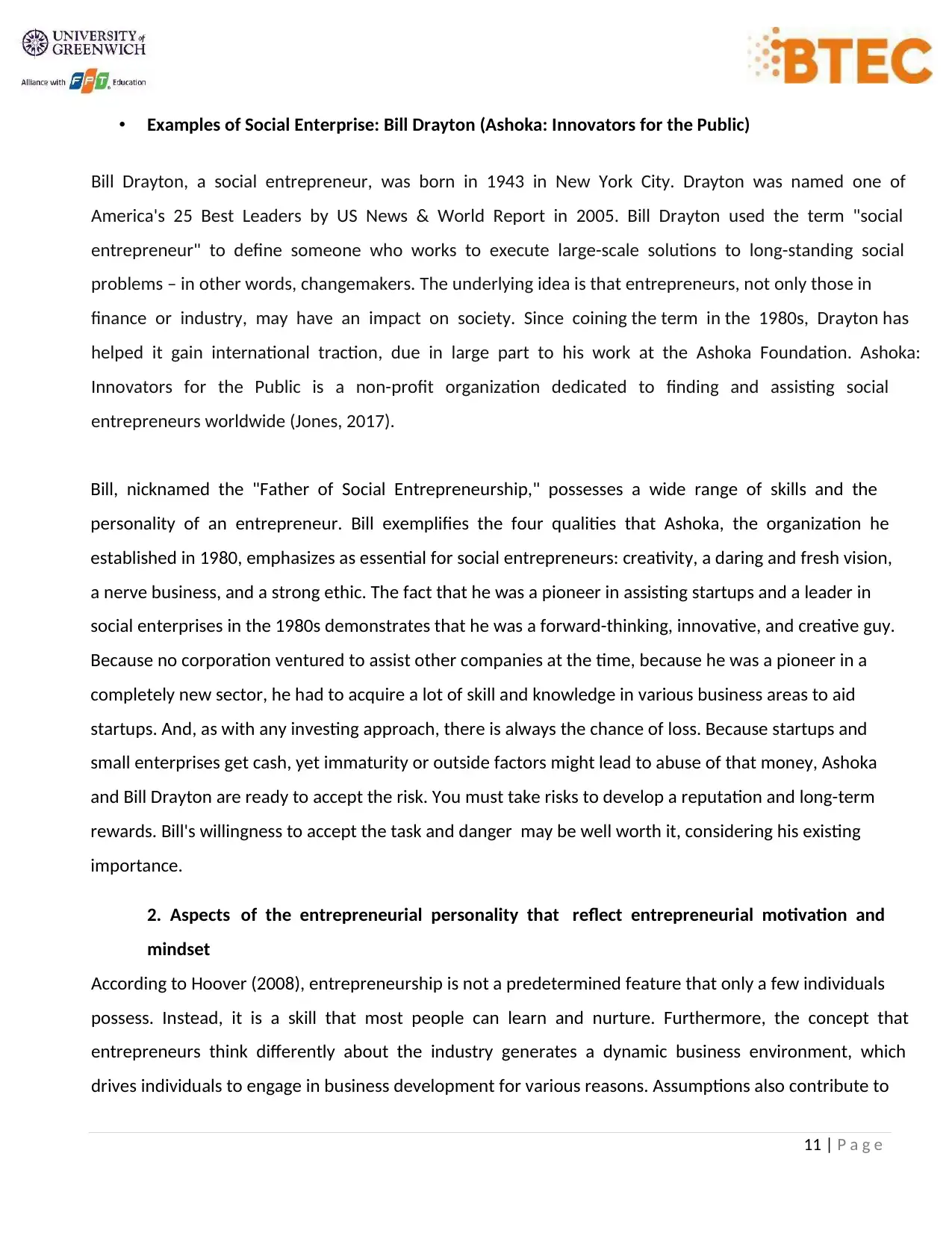
11 | P a g e
• Examples of Social Enterprise: Bill Drayton (Ashoka: Innovators for the Public)
Bill Drayton, a social entrepreneur, was born in 1943 in New York City. Drayton was named one of
America's 25 Best Leaders by US News & World Report in 2005. Bill Drayton used the term "social
entrepreneur" to define someone who works to execute large-scale solutions to long-standing social
problems – in other words, changemakers. The underlying idea is that entrepreneurs, not only those in
finance or industry, may have an impact on society. Since coining the term in the 1980s, Drayton has
helped it gain international traction, due in large part to his work at the Ashoka Foundation. Ashoka:
Innovators for the Public is a non-profit organization dedicated to finding and assisting social
entrepreneurs worldwide (Jones, 2017).
Bill, nicknamed the "Father of Social Entrepreneurship," possesses a wide range of skills and the
personality of an entrepreneur. Bill exemplifies the four qualities that Ashoka, the organization he
established in 1980, emphasizes as essential for social entrepreneurs: creativity, a daring and fresh vision,
a nerve business, and a strong ethic. The fact that he was a pioneer in assisting startups and a leader in
social enterprises in the 1980s demonstrates that he was a forward-thinking, innovative, and creative guy.
Because no corporation ventured to assist other companies at the time, because he was a pioneer in a
completely new sector, he had to acquire a lot of skill and knowledge in various business areas to aid
startups. And, as with any investing approach, there is always the chance of loss. Because startups and
small enterprises get cash, yet immaturity or outside factors might lead to abuse of that money, Ashoka
and Bill Drayton are ready to accept the risk. You must take risks to develop a reputation and long-term
rewards. Bill's willingness to accept the task and danger may be well worth it, considering his existing
importance.
2. Aspects of the entrepreneurial personality that reflect entrepreneurial motivation and
mindset
According to Hoover (2008), entrepreneurship is not a predetermined feature that only a few individuals
possess. Instead, it is a skill that most people can learn and nurture. Furthermore, the concept that
entrepreneurs think differently about the industry generates a dynamic business environment, which
drives individuals to engage in business development for various reasons. Assumptions also contribute to
• Examples of Social Enterprise: Bill Drayton (Ashoka: Innovators for the Public)
Bill Drayton, a social entrepreneur, was born in 1943 in New York City. Drayton was named one of
America's 25 Best Leaders by US News & World Report in 2005. Bill Drayton used the term "social
entrepreneur" to define someone who works to execute large-scale solutions to long-standing social
problems – in other words, changemakers. The underlying idea is that entrepreneurs, not only those in
finance or industry, may have an impact on society. Since coining the term in the 1980s, Drayton has
helped it gain international traction, due in large part to his work at the Ashoka Foundation. Ashoka:
Innovators for the Public is a non-profit organization dedicated to finding and assisting social
entrepreneurs worldwide (Jones, 2017).
Bill, nicknamed the "Father of Social Entrepreneurship," possesses a wide range of skills and the
personality of an entrepreneur. Bill exemplifies the four qualities that Ashoka, the organization he
established in 1980, emphasizes as essential for social entrepreneurs: creativity, a daring and fresh vision,
a nerve business, and a strong ethic. The fact that he was a pioneer in assisting startups and a leader in
social enterprises in the 1980s demonstrates that he was a forward-thinking, innovative, and creative guy.
Because no corporation ventured to assist other companies at the time, because he was a pioneer in a
completely new sector, he had to acquire a lot of skill and knowledge in various business areas to aid
startups. And, as with any investing approach, there is always the chance of loss. Because startups and
small enterprises get cash, yet immaturity or outside factors might lead to abuse of that money, Ashoka
and Bill Drayton are ready to accept the risk. You must take risks to develop a reputation and long-term
rewards. Bill's willingness to accept the task and danger may be well worth it, considering his existing
importance.
2. Aspects of the entrepreneurial personality that reflect entrepreneurial motivation and
mindset
According to Hoover (2008), entrepreneurship is not a predetermined feature that only a few individuals
possess. Instead, it is a skill that most people can learn and nurture. Furthermore, the concept that
entrepreneurs think differently about the industry generates a dynamic business environment, which
drives individuals to engage in business development for various reasons. Assumptions also contribute to
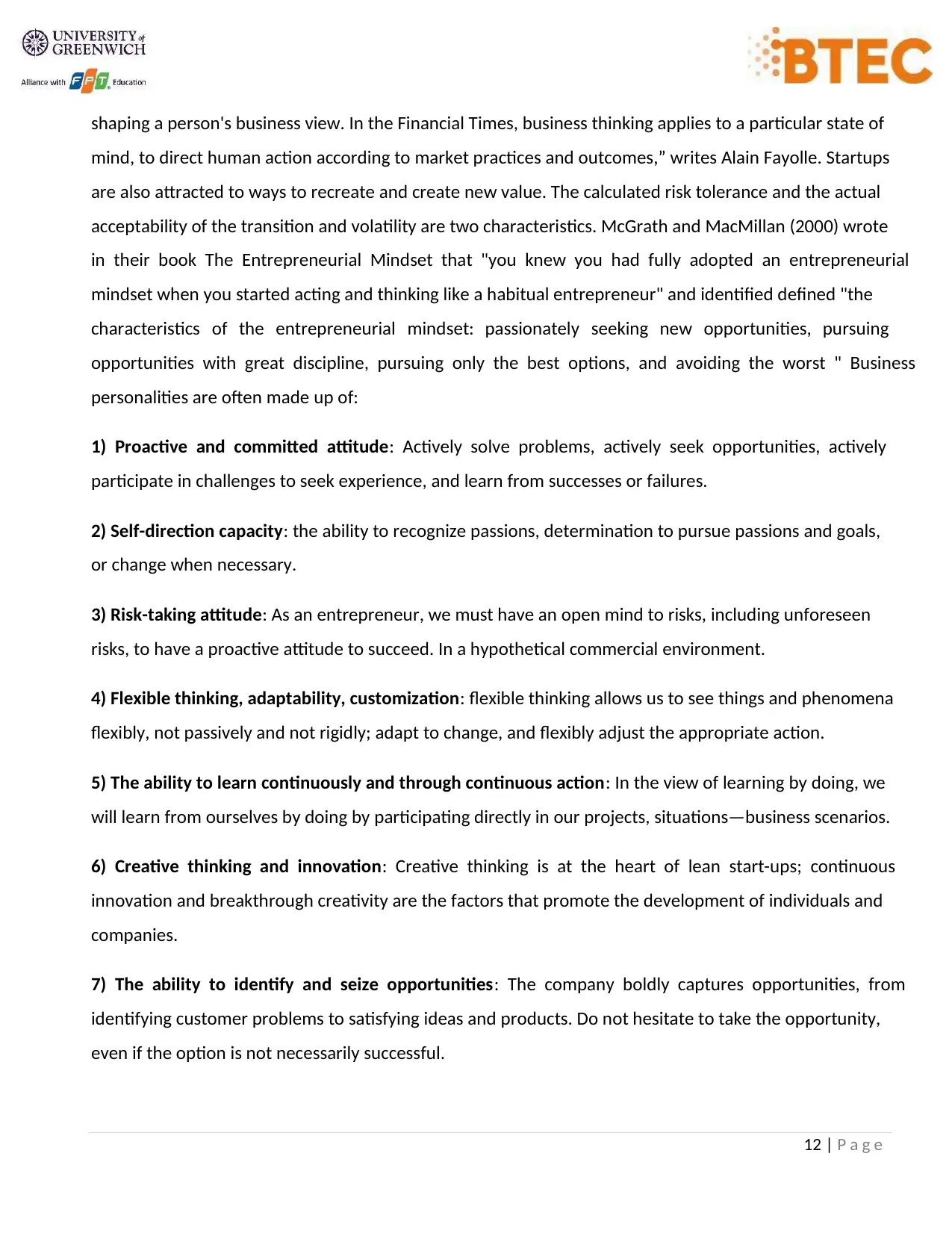
12 | P a g e
shaping a person's business view. In the Financial Times, business thinking applies to a particular state of
mind, to direct human action according to market practices and outcomes,” writes Alain Fayolle. Startups
are also attracted to ways to recreate and create new value. The calculated risk tolerance and the actual
acceptability of the transition and volatility are two characteristics. McGrath and MacMillan (2000) wrote
in their book The Entrepreneurial Mindset that "you knew you had fully adopted an entrepreneurial
mindset when you started acting and thinking like a habitual entrepreneur" and identified defined "the
characteristics of the entrepreneurial mindset: passionately seeking new opportunities, pursuing
opportunities with great discipline, pursuing only the best options, and avoiding the worst " Business
personalities are often made up of:
1) Proactive and committed attitude: Actively solve problems, actively seek opportunities, actively
participate in challenges to seek experience, and learn from successes or failures.
2) Self-direction capacity: the ability to recognize passions, determination to pursue passions and goals,
or change when necessary.
3) Risk-taking attitude: As an entrepreneur, we must have an open mind to risks, including unforeseen
risks, to have a proactive attitude to succeed. In a hypothetical commercial environment.
4) Flexible thinking, adaptability, customization: flexible thinking allows us to see things and phenomena
flexibly, not passively and not rigidly; adapt to change, and flexibly adjust the appropriate action.
5) The ability to learn continuously and through continuous action: In the view of learning by doing, we
will learn from ourselves by doing by participating directly in our projects, situations—business scenarios.
6) Creative thinking and innovation: Creative thinking is at the heart of lean start-ups; continuous
innovation and breakthrough creativity are the factors that promote the development of individuals and
companies.
7) The ability to identify and seize opportunities: The company boldly captures opportunities, from
identifying customer problems to satisfying ideas and products. Do not hesitate to take the opportunity,
even if the option is not necessarily successful.
shaping a person's business view. In the Financial Times, business thinking applies to a particular state of
mind, to direct human action according to market practices and outcomes,” writes Alain Fayolle. Startups
are also attracted to ways to recreate and create new value. The calculated risk tolerance and the actual
acceptability of the transition and volatility are two characteristics. McGrath and MacMillan (2000) wrote
in their book The Entrepreneurial Mindset that "you knew you had fully adopted an entrepreneurial
mindset when you started acting and thinking like a habitual entrepreneur" and identified defined "the
characteristics of the entrepreneurial mindset: passionately seeking new opportunities, pursuing
opportunities with great discipline, pursuing only the best options, and avoiding the worst " Business
personalities are often made up of:
1) Proactive and committed attitude: Actively solve problems, actively seek opportunities, actively
participate in challenges to seek experience, and learn from successes or failures.
2) Self-direction capacity: the ability to recognize passions, determination to pursue passions and goals,
or change when necessary.
3) Risk-taking attitude: As an entrepreneur, we must have an open mind to risks, including unforeseen
risks, to have a proactive attitude to succeed. In a hypothetical commercial environment.
4) Flexible thinking, adaptability, customization: flexible thinking allows us to see things and phenomena
flexibly, not passively and not rigidly; adapt to change, and flexibly adjust the appropriate action.
5) The ability to learn continuously and through continuous action: In the view of learning by doing, we
will learn from ourselves by doing by participating directly in our projects, situations—business scenarios.
6) Creative thinking and innovation: Creative thinking is at the heart of lean start-ups; continuous
innovation and breakthrough creativity are the factors that promote the development of individuals and
companies.
7) The ability to identify and seize opportunities: The company boldly captures opportunities, from
identifying customer problems to satisfying ideas and products. Do not hesitate to take the opportunity,
even if the option is not necessarily successful.
⊘ This is a preview!⊘
Do you want full access?
Subscribe today to unlock all pages.

Trusted by 1+ million students worldwide
1 out of 36
Related Documents
Your All-in-One AI-Powered Toolkit for Academic Success.
+13062052269
info@desklib.com
Available 24*7 on WhatsApp / Email
![[object Object]](/_next/static/media/star-bottom.7253800d.svg)
Unlock your academic potential
Copyright © 2020–2026 A2Z Services. All Rights Reserved. Developed and managed by ZUCOL.





